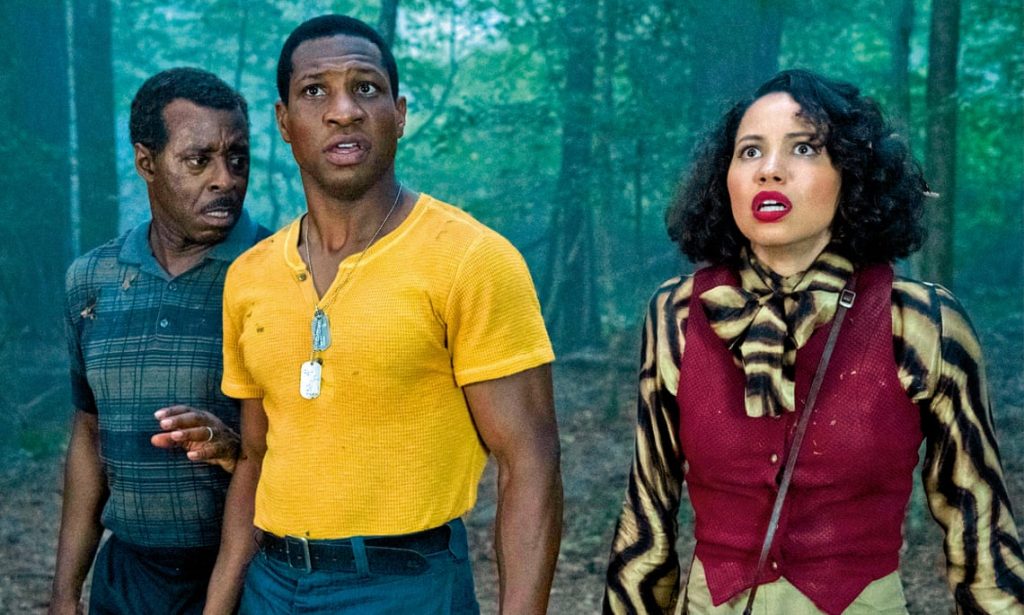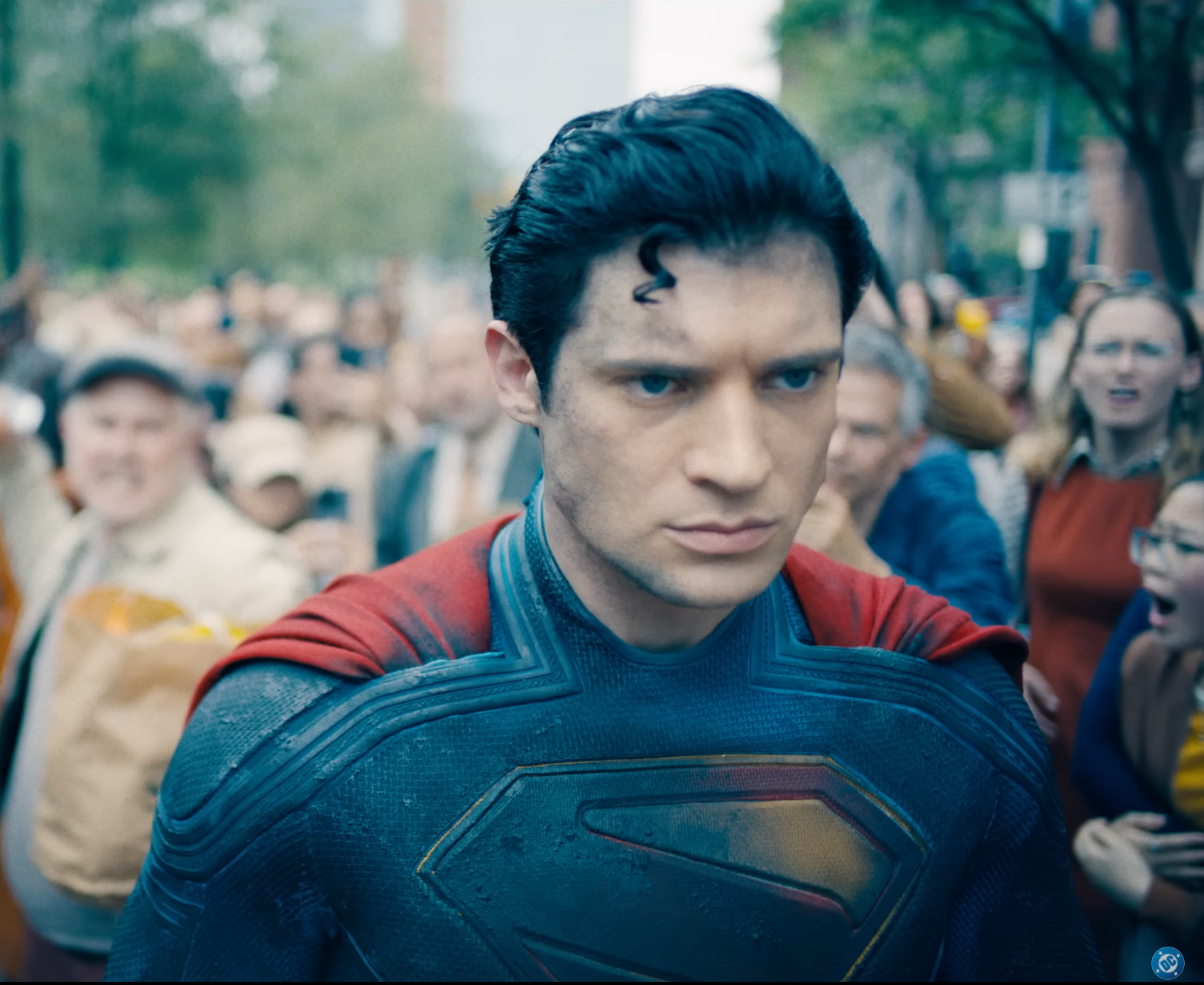Lovecraft Country does not ignore the problematic nature of the author from whom it took inspiration.
In the opening moments of HBO’s Lovecraft Country, you’re presented by two very different, but very telling, scenes about what the show is grappling with. The first is a mash-up of many different pulp stories that are centering on a protagonist of color, Atticus (Tic). We’re dropped into the middle of a black and white dream. Here, Atticus leads a troop of Buffalo Soldiers through war-torn Korea.
As color bleeds into the world, the battle against the communists gives way to a War of the Worlds-style invasion and an alien princess descending from a ship. All of this is interrupted by the arrival of Cthulhu, the cosmic and ancient deity. This familiar deity is quickly felled by (checks notes) Jackie Robinson. It’s jarring, but when you find out what he’s been reading, it makes slightly more sense.
The second scene is quieter, but speaks volumes about what people of color generally wrestle with when watching entertainment. As they walk down the road, Atticus details the plot of the novel he’s been reading, The Princess of Mars, to his companion. When he describes John Carter as an “ex-Confederate soldier,” his companion dismisses the story out of hand. “He fought for slavery. You don’t get to put an ‘ex’ on that.” Atticus acknowledges her criticism and offers a weak defense. “Stories are like people: Loving them doesn’t make them perfect. You just try to cherish them. Overlook their flaws.”
RELATED – Jordan Peele, Issa Rae Team For Sinkhole, A New Genre Film For Universal
https://youtu.be/VJV9acMsDwM
In a sense, they’re both right. Women and characters of color were often excluded from these pulp novels, comics and films. When they were included, their roles were limited and stereotypical. Their access to even create and publish these stories was hindered. Call to mind Benny Russell from Deep Space Nine’s Far Beyond the Stars. On the consumer side, people of color frequently had to deal with the fact that the characters, such as John Carter, often represented the worst parts of humanity.
So, what makes Lovecraft so problematic?
Visually and stylistically, the work of Lovecraft influenced the likes of H.R. Giger, Stephen King, Guillermo Del Toro, James Cameron, John Carpenter, and many more. His influence is so great that he pretty much created his own genre. Unless you know much about the man, you’d be forgiven for not twitching when hearing the phrase “Lovecraftian.”
Interwoven into the pulp stories of Lovecraft were his deepest held beliefs as a white supremacist and anti-Semite. For an example, see The Horror at Red Hook. The story chronicles an Aryan civilization as the last hope against a “primitive half-ape savagery” of lesser races.
Beyond his stories, his letters were more revealing. For Lovecraft, the details of Naziism were bad, but not as bad as Communism. Of Hitler, Lovecraft found time to praise the leader of the Third Reich, stating, “I know he’s a clown but god I like the boy!” There was even enough hate in his heart for Jews and the Irish. Despite his views, his works have bled into American genre novels, television, and pop culture, so it’s only a small consolation that he died penniless.
Embracing the influence without acknowledging the xenophobia and racism is the biggest problem with Lovecraft’s devotees. There’s an exchange in Lovecraft Country where a character recounts his father forcing him to read Lovecraft’s poem “On the Creation of N*ggers.” Much like a conversation Atticus has with Tony Goldwyn, the poem is about how the gods put everything in their place and the place of black people is subhuman. This is only one example highlighted by the series, but you could easily find more on your own.
Correcting the Legacy
From video games to novels to television, creators are acknowledging that while his work was influential, the author is not to be extolled. Admittedly, the first time I’d heard of Lovecraft Country by Matt Ruff, was in a Twitter thread by the Fate of Cthulu production team. This spurred me to read Reimagining Lovecraft.
While developing Fate of Cthulhu, we were obligated to reflect on the problematic roots of the source material.
We tackle that on page 6.
The mythos is definitely worth exploring – it's also worth re-examining.https://t.co/v0F853zsM0 pic.twitter.com/6WKcg0eSf2— Evil Hat Productions (@EvilHatOfficial) January 17, 2020
Mirroring the opening dream sequence, what remains of Lovecraft Country is a genre-crossing and genre-bending romp. It evokes equal parts Indiana Jones and American Horror Story as it brings in common horror/sci-fi tropes such as the occult, “vampires,” haunted houses and derelict ships. This is all done against the backdrop of 1950s America, which claimed to be “the world’s highest standard of living,” because “there’s no way like the American way.” This was, of course, done while white Americans within the power structure simultaneously subjugated and terrorized large swaths of the US population.

A fantastic as the world is, the story of Lovecraft Country always comes back to the characters. The series features characters who are deeply flawed and hurt by their experiences and the world around them. Misha Green, creator and showrunner of Underground, brings not only enthusiasm to the project, but star Jurnee Smollett-Bell, who absolutely crushes it as Letitia. Along with Courtney B. Vance, Jonathan Majors, and Michael K. Williams, we get a well-rounded and stacked cast that shines, regardless of whether the moments are character development or thrilling.
RELATED – Jordan Peele Teases The Upcoming Candyman Trailer, And We’re Already Freaked Out
In Lovecraft Country, we get an extended version of an idea that was seeded in Jordan Peele’s Twilight Zone reboot with the episode “Replay.” In “Replay,” the protagonists did everything they could to outrun, outthink and even placate a racist police officer. Every encounter ended tragically. Contrast that with Lovecraft Country, where every terror and every horror in this show can be outrun, out-thought and outfought. Unfortunately, for every otherworldly encounter that our heroes overcome, they are still in a country that hates them, simply for being who they are.
It’s telling then, that while facing off against monsters, ghosts and occultists evoke thrills, the most gripping moments of the series are with police officers chasing the protagonists out of town. That is the real trick of Lovecraft Country: it shows that as frightening as fictional monsters can be, they pale in comparison to the reality of the sundown towns of yesterday and the police terrorism of today.
Produced by Jordan Peele and JJ Abrams, Lovecraft Country premieres on HBO on 16 August and stars Jurnee Smollett-Bell, Courtney B. Vance, Jonathan Majors and Michael K. Williams and Wunmi Mosaku.
Did you get a chance to see Lovecraft Country? If so, what are your thoughts on?
Don’t forget to share this post on your Facebook wall and with your Twitter followers! Just hit the buttons on the top of this page.
—–
Have you checked out LRM Online’s official podcast feed yet The LRM Online Podcast Network, which includes our flagship podcast Los Fanboys, our premiere podcast Breaking Geek Radio: The Podcast, and our morning show LRMornings? Check it out by listening below. It’s also available on all your favorite podcast apps!
Subscribe on: Apple Podcasts | Spotify | SoundCloud | Stitcher | Google Play

 FOR FANBOYS, BY FANBOYS
Have you checked out LRM Online’s official podcasts and videos on The Genreverse Podcast Network? Available on YouTube and all your favorite podcast apps, This multimedia empire includes The Daily CoG, Breaking Geek Radio: The Podcast, GeekScholars Movie News, Anime-Versal Review Podcast, and our Star Wars dedicated podcast The Cantina. Check it out by listening on all your favorite podcast apps, or watching on YouTube!
Subscribe on: Apple Podcasts | Spotify | SoundCloud | Stitcher | Google Play
FOR FANBOYS, BY FANBOYS
Have you checked out LRM Online’s official podcasts and videos on The Genreverse Podcast Network? Available on YouTube and all your favorite podcast apps, This multimedia empire includes The Daily CoG, Breaking Geek Radio: The Podcast, GeekScholars Movie News, Anime-Versal Review Podcast, and our Star Wars dedicated podcast The Cantina. Check it out by listening on all your favorite podcast apps, or watching on YouTube!
Subscribe on: Apple Podcasts | Spotify | SoundCloud | Stitcher | Google Play



